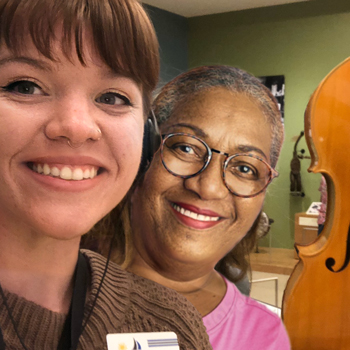
Now she’s happy to go out to a museum or the zoo. But that was not the case before. Ever since she had to retire due to moderate frontotemporal dementia, Maureen was withdrawn. Not herself. So her niece called Thoughtful Engagement.
Serving Hunterdon, Somerset, Mercer, Middlesex, and Warren Counties

Now she’s happy to go out to a museum or the zoo. But that was not the case before. Ever since she had to retire due to moderate frontotemporal dementia, Maureen was withdrawn. Not herself. So her niece called Thoughtful Engagement.

Diane’s son, Joe, was diagnosed in his twenties with paranoid schizophrenia. At fifty he was living in a group home. He was generally stable but spent most of his time smoking and alone. Diane, now in her seventies, was experiencing health challenges. She worried about what would happen to Joe when she was gone.

Chelsea was worried about her dad, Mark. He used to be so outgoing. But lately he refused to leave the house. It wasn’t COVID or dementia. He was simply too anxious. His dog, Maggie, held the key.

When Peggy’s husband died, she found it very difficult to go out in the world without him. She even quit going to church because it was too painful when people asked how she was doing. Her daughter, Debbie, lived far away and was extremely concerned because her mother had now lost not only her husband, but also her spiritual and social community.

Roberto was a confirmed bachelor and beloved uncle to his many nieces and nephews. Always the life of the party at family barbeques, he had begun to withdraw. He no longer hung out with his buddies, and he was even losing weight. The family wasn’t sure what to do.

James, a long distance son, was worried about his mother’s isolation and lack of mental stimulation following a series of minor strokes. Ruth had been a tenured professor of Art History, but had retreated since her husband’s death. She was becoming so withdrawn, it was difficult for James to have conversations with her on the phone.

Sarah, a caregiving wife with health issues had a husband, Tom, who was prone to falling. She needed to go to her medical appointments, but her husband kept firing the caregivers she hired to stay with him.

Reiko had always been a happy, talkative person. But four months after moving into an assisted living community, the staff confirmed that Reiko spent most of her time in her room. Her daughter, Sue, was concerned. This wasn’t like her mother. Sue also felt guilty because she had encouraged the move.

Dave’s wife, Cindy, never got a moment to herself. Her energetic husband, Dave, had moderate dementia and demanded her attention all the time. He had even begun wandering. She was worried she couldn’t keep him at home much longer.
© 2002-2025, NightingaleNJ. Site created by Elder Pages Online, LLC.